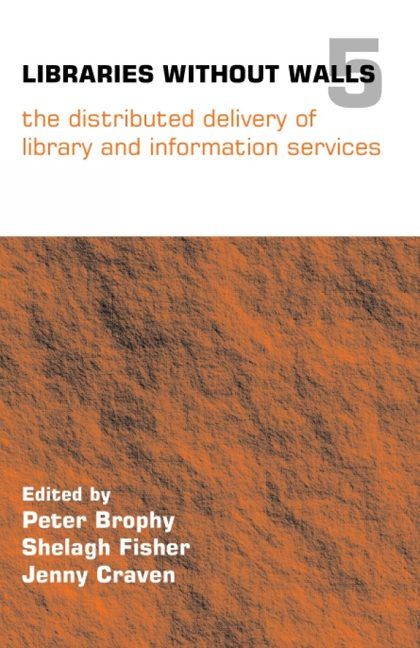Book contents
- Frontmatter
- Contents
- Contributors
- 1 Introduction
- 2 Keynote paper: beyond the mainstream of library services
- THEME 1 THE INTEGRATION OF LIBRARY SERVICES AND VIRTUAL LEARNING ENVIRONMENTS
- THEME 2 THE RELATIONSHIP BETWEEN USER NEEDS, INFORMATION SKILLS AND INFORMATION LITERACIES
- THEME 3 USABILITY AND ACCESSIBILITY OF DIGITAL LIBRARY SERVICES
- THEME 4 DESIGNING THE INFORMATION ENVIRONMENT: NATIONAL AND INSTITUTIONAL PERSPECTIVES
- THEME 5 THE CREATION OF DIGITAL RESOURCES BY USER COMMUNITIES
- 21 Cultural Objects in Networked Environments (COINE)
- 22 The DAEDALUS project: an open archiving initiative
- 23 Librarians in digital communities of practice
- 24 X4L: Exchange for Learning
- Index
- Miscellaneous Endmatter
- Miscellaneous Endmatter
- misc-endmatter
- Miscellaneous Endmatter
21 - Cultural Objects in Networked Environments (COINE)
from THEME 5 - THE CREATION OF DIGITAL RESOURCES BY USER COMMUNITIES
Published online by Cambridge University Press: 08 June 2018
- Frontmatter
- Contents
- Contributors
- 1 Introduction
- 2 Keynote paper: beyond the mainstream of library services
- THEME 1 THE INTEGRATION OF LIBRARY SERVICES AND VIRTUAL LEARNING ENVIRONMENTS
- THEME 2 THE RELATIONSHIP BETWEEN USER NEEDS, INFORMATION SKILLS AND INFORMATION LITERACIES
- THEME 3 USABILITY AND ACCESSIBILITY OF DIGITAL LIBRARY SERVICES
- THEME 4 DESIGNING THE INFORMATION ENVIRONMENT: NATIONAL AND INSTITUTIONAL PERSPECTIVES
- THEME 5 THE CREATION OF DIGITAL RESOURCES BY USER COMMUNITIES
- 21 Cultural Objects in Networked Environments (COINE)
- 22 The DAEDALUS project: an open archiving initiative
- 23 Librarians in digital communities of practice
- 24 X4L: Exchange for Learning
- Index
- Miscellaneous Endmatter
- Miscellaneous Endmatter
- misc-endmatter
- Miscellaneous Endmatter
Summary
Introduction
For memory institutions to reach broader audiences, they need to move beyond resource discovery and offer services that also relate to people's lives. (DigiCULT, 2002)
Recent studies, such as the 2002 DigiCULT Report (Technological landscapes for tomorrow's cultural economy: unlocking the value of cultural heritage), are beginning to suggest that there has been a shift in emphasis for digitization projects within museums, libraries and archives. While digitizing collections and putting information online remains the valid goal of most institutions, it is now being recognized that greater value can be added to these collections and sources of information if the role of the ‘user’ is more closely examined and the resources interpreted accordingly. The aim of simply creating digital content on websites and databases has been surpassed by the desire to enhance, manipulate or change the content according to the requirements of a specific audience, therefore making resources relevant to individual users. The DigiCULT Report highlights this change and the increasing demand for ‘high quality, enriched digital content’ (DigiCULT, 2002, 8) with an emphasis on lifelong learning and the relating of cultural resources to individual lives.
The COINE (Cultural Objects In Networked Environments) project is rooted in the idea of digital cultural heritage being driven by user communities. It embraces the possibility of there being a ‘two-way’ flow of information and cultural heritage resources: no longer should it only be museums, libraries and archives that create the digital content for remote users, but these institutions should also present the opportunity for the users themselves to be active in this creative process, using information technology to improve the sharing of and access to community heritage, collections and personal stories.
It is from this vision – where users are as active as institutions in the portrayal of community heritage – that the COINE project was born. Could an information system be developed that would:
• allow people to create and publish their own stories and resources?
• be suitable for people with limited experience of information and digital technology?
• perform complex searches?
• be capable of handling many hundreds of thousands of objects and narratives while still producing usable results?
- Type
- Chapter
- Information
- Libraries Without Walls 5The Distributed Delivery of Library and Information Services, pp. 219 - 226Publisher: FacetPrint publication year: 2004



